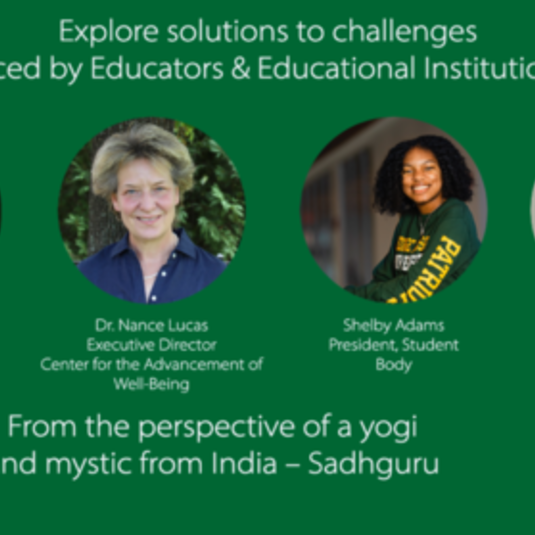By: Whitney Hopler, Communications Manager, Center for the Advancement of Well-Being
How can the George Mason University community thrive together despite the COVID-19 pandemic, racial injustice, and economic crises? A panel of Mason leaders interviewed Indian yogi Sadhguru to discuss strategies to do so. Sadhguru, whose educational and social service work in India through his Isha Foundation is known worldwide, applies well-being principles derived from yoga to help people learn and grow.
The Mason panelists who discussed well-being with Sadhguru were Interim President Anne Holton, Board of Visitors Member Anjan Chimaladinne, Center for the Advancement of Well-Being Executive Director Nance Lucas, and Student Body President Shelby Adams.
“The challenges we face now are also opportunities for growth and wisdom,” Holton said. “We are all in unfamiliar situations now that we don’t know how to handle. Sadhguru pointed out this is when we grow.”
It’s vital to respond consciously—rather than simply reacting—to a challenge, said Visitor Chimaladinne, who shared that Sadhguru’s teachings helped him and his wife strengthen their well-being while grieving their son’s death. “It’s how you respond to it. You can become wounded, or you can become wise.”
Sadhguru emphasized the importance of conducting “every aspect of our lives consciously.” Our mental, physical, and spiritual faculties “must work for us, not against us,” he said.
President Holton said she appreciated Sadhguru’s message that, “Education in this technological age must be more about inspiration than information—and more about opportunities for personal growth.”
The crises we’re facing are opportunities for universities to change in ways that better serve students, said Sadhguru. He emphasized that universities can serve students best by going beyond information to inspiration. Students can easily find information online, he pointed out, but they need inspiration to learn and grow in ways that strengthen their well-being. “It is not about disseminating information.… What we need is an inspirational school.”
Adams, a criminology, law, and society major, said she found Sadhguru’s message inspirational.
“As a college student, in what seems like a new world, with COVID-19 and the ongoing issue of racial injustice, things have become more challenging to handle,” Adams said. “But I truly believe what Sadhguru said when he mentioned how if we knew the answers to everything, there would be no opportunity to grow. Challenges allow for growth. Unprecedented situations allow for growth. I think this is a time for all of us to learn more about ourselves and the world around us.”
Sadhguru also urged the Mason Nation to continue to focus on diversity and inclusion education. He said that injustice “is in the minds and hearts of people—that is not going away by protests. That is going to go by awareness. If you experientially know that you’re a part of everything, prejudice cannot exist in your mind. So it is very important that inclusiveness is a part of education.”
“I loved his comment that leaders must especially attend to their inner work, because their impact is magnified—for better or worse,” Holton said.
The work of well-being is an important way forward to the positive transformation Sadhguru discussed, said Lucas.
“Sadhguru’s message on rethinking education to maximize human potential, allowing all of us to be our best possible selves, is important alongside this pandemic and growing racial injustices,” Lucas continued. “We have to get out of our comfort zones and into our inner learning zones if we want to see change toward a more just world. I strongly believe that this type of inspirational education, as Sadhguru defines it, is the most powerful catalyst for transformation and human flourishing. This is the work of well-being and evolving into our best selves.”

